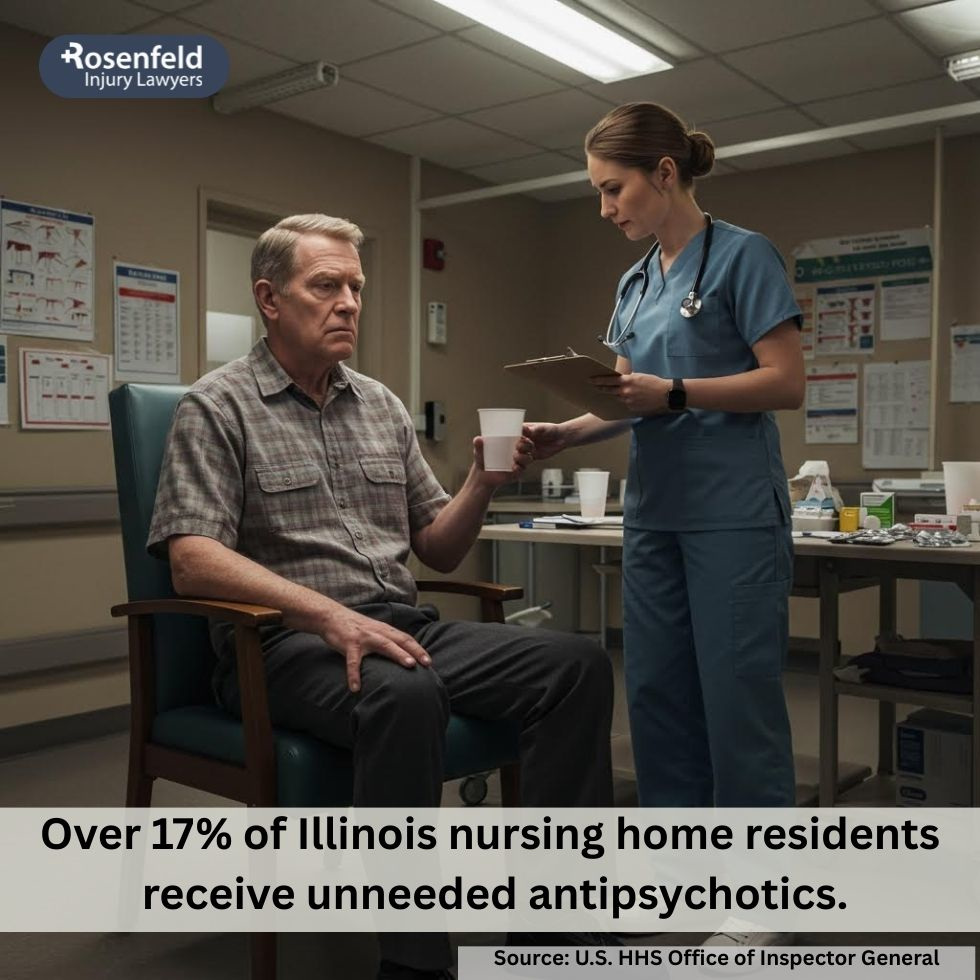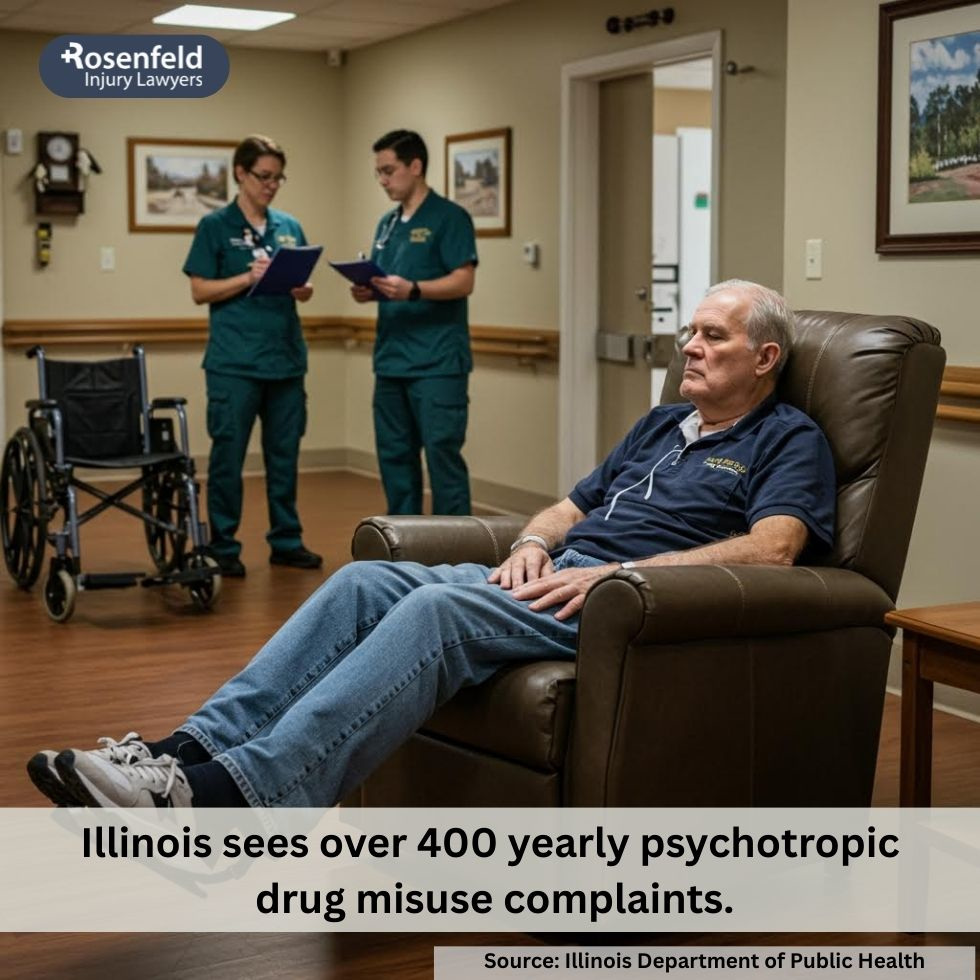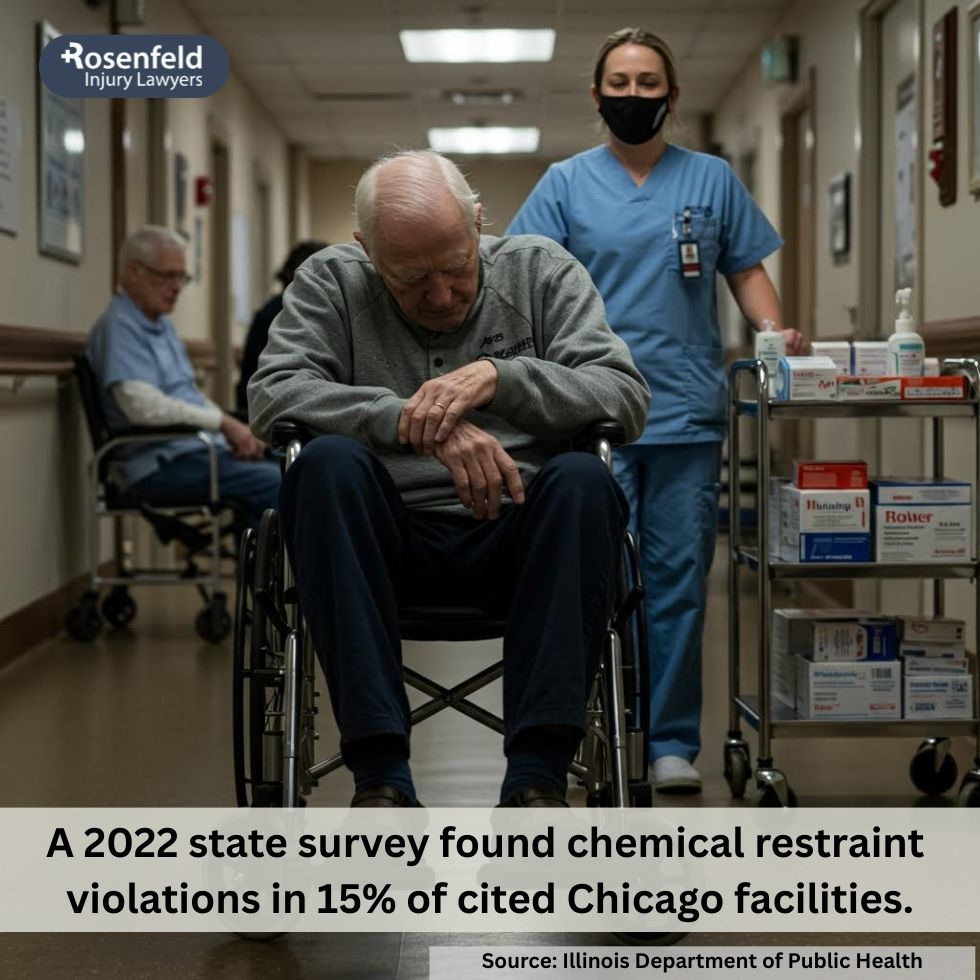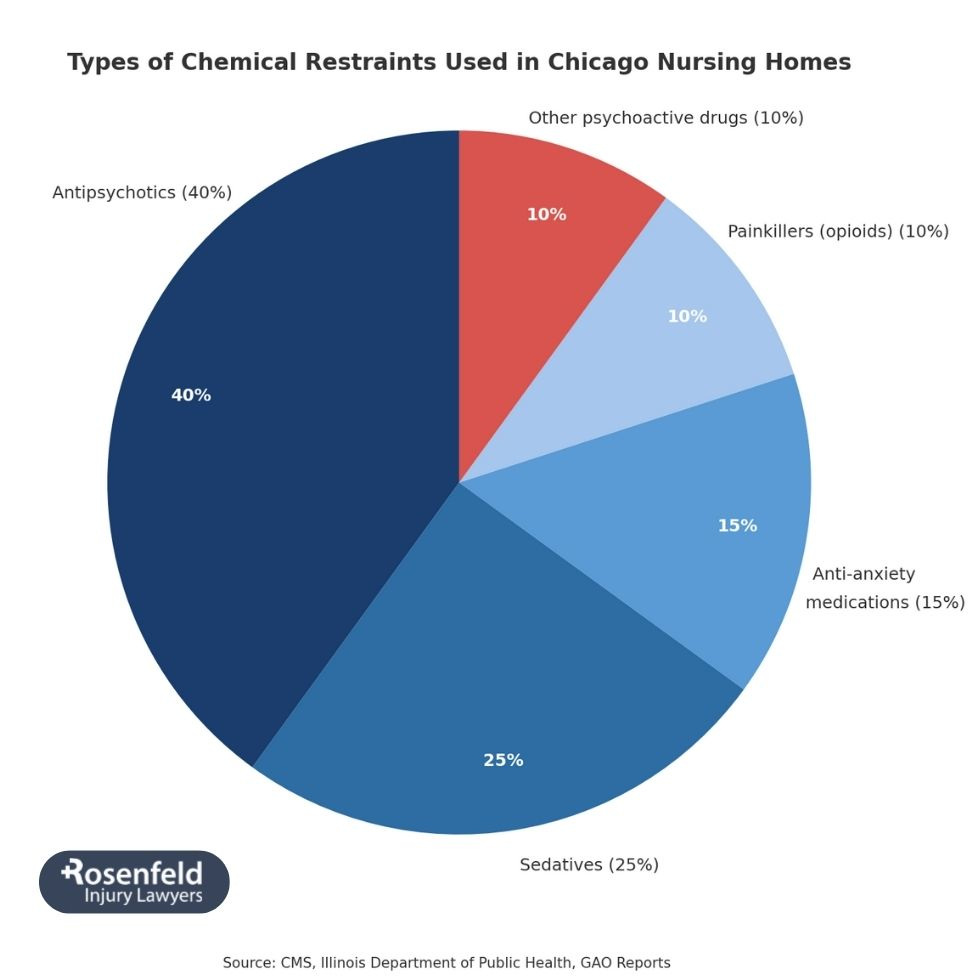- 24/7 Free Consultation: (888) 424-5757 Tap Here To Call Us
Chicago Nursing Home Chemical Restraints Lawyer

Compensation for Victims of Chemical Restraints
A Chicago nursing home chemical restraints lawyer from Rosenfeld Injury Lawyers can help families concerned about the misuse of medications in long-term care facilities take legal action. With over 25 years of experience and more than $450 million recovered, our team fights to hold negligent facilities accountable and pursue justice for victims of nursing home abuse.
We can help investigate the case, gather critical evidence, and seek the compensation your family deserves. If you suspect your loved one has been subjected to chemical restraints in a nursing home, contact our nursing home abuse attorneys in Chicago for a free consultation.
Settlements Recovered by Our Chicago Law Firm
Here are some example settlements on behalf of victims of nursing home abuse and neglect:
- $3,000,000 – Wrongful death settlement for a woman whose husband developed fatal pressure sores after being admitted to a skilled nursing facility following hip surgery.
- $2,333,000 – Settlement on behalf of two women who suffered sexual assault by a certified nursing assistant (CNA).
- $2,150,000 – Wrongful death payout involving severe bedsores and sepsis acquired in a long-term care facility.
- $1,700,000 – Settlement for a nursing home fall that led to a subdural hematoma and fractured hip.
- $1,500,000 – Recovery for the family of a dementia patient who died after ingesting toxic chemicals left unsecured in a storage closet.

What are Chemical Restraints?
Chemical restraints involve the use of medications to manage a nursing home resident’s behavior or restrict their movement, rather than to treat a specific medical condition.
Chemical restraints typically include psychoactive drugs administered to reduce uncooperative behavior, restlessness, or pacing. While these medications can be beneficial when used under a doctor’s orders for treating conditions like depression or dementia, they can have dangerous side effects and long-term health consequences.
Types of Medications Used
Common drug classes used as chemical restraints include:
- Antipsychotic drugs, such as Haloperidol (Haldol), Risperidone (Risperdal), and Olanzapine (Zyprexa), which pose serious risks like stroke, heart failure, movement disorders, and early death, particularly in elderly patients with dementia.
- Sedatives and hypnotics, including Lorazepam (Ativan), Diazepam (Valium), and Zolpidem (Ambien), can cause severe drowsiness, confusion, memory issues, and an increased risk of falls.
- Anxiolytics (anti-anxiety medications) like Alprazolam (Xanax) and Clonazepam (Klonopin) may lead to physical dependence, cognitive impairment, and breathing difficulties.
- Mood stabilizers and antidepressants, such as Lithium, Fluoxetine (Prozac), and Sertraline (Zoloft), can cause dizziness, low blood pressure, metabolic issues, and worsened confusion when used improperly.
Why Chemical Restraints are Concerning
The use of chemical restraints is a significant concern, as it can lead to serious health complications, emotional distress, and violations of nursing home residents’ rights. It’s essential for nursing home staff to adhere to ethical and legal standards, ensuring that medications are used appropriately and only when medically necessary.
The health risks associated with using chemical restraints include:
- Over-Sedation and Cognitive Decline – Excessive medication can cause lethargy, confusion, and disorientation, increasing the risk of injury and decline.
- Fall Risk – Antipsychotics and sedatives weaken balance and muscles, leading to serious falls and fractures.
- Organ and Metabolic Damage – Long-term use may cause kidney failure, liver damage, diabetes, and severe weight changes.
- Infection Risk – Sedated residents are less active and have difficulty eating, raising the risk of pneumonia and other infections.
- Premature Death – Elderly residents given antipsychotics face a higher risk of stroke, heart failure, and early death.

Regulations and Guidelines on Chemical Restraints
Laws at both the federal and state levels regulate the use of chemical restraints to protect nursing home residents from unnecessary or harmful medication practices. Facilities that violate these regulations may be held accountable for nursing home abuse and negligence.
Federal Nursing Home Reform Act
The Nursing Home Reform Act (NHRA), part of the Omnibus Budget Reconciliation Act of 1987 (OBRA 87), establishes federal protections for nursing home residents. The law guarantees that residents have the right to be free from chemical restraints unless they are medically necessary to treat a documented condition. Key provisions include:
- Facilities cannot use medications as a form of discipline or staff convenience.
- Residents must receive individualized care plans, including proper medication management.
- Facilities must obtain informed consent from the resident or their legal guardian before administering psychotropic medications.
- Regular reviews of medication use are required to determine if the resident still needs the drug or if it should be reduced or discontinued.
Illinois State Law
According to Illinois Administrative Code Title 77, Section 300.680, nursing home residents cannot be given psychotropic drugs unless prescribed by a doctor for a legitimate medical reason. The law explicitly prohibits using these drugs for discipline or staff convenience rather than for treating medical issues.
The improper use of medications as chemical restraints can constitute nursing home abuse and may be grounds for legal action. Our Chicago nursing home abuse lawyers can help investigate these cases, ensuring that facilities and staff are held accountable.
When Chemical Restraints Might Be Justified
While the use of chemical restraints in Illinois nursing facilities is heavily restricted, there are limited situations where medications may be medically necessary. However, these cases require strict documentation, informed consent, and ongoing review to ensure they are not being misused.
Limited Medical Necessity
The only justifiable reason for using chemical restraints is when a resident poses an immediate danger to themselves or others, and no less restrictive interventions have been effective. This may include:
- Severe Aggression or Psychosis – If a resident is experiencing violent outbursts due to a medical condition, medication may be needed to prevent harm.
- Extreme Anxiety or Delirium – In rare cases, short-term use of medication may be necessary to help a resident who is experiencing severe distress or confusion that puts them at risk.
- Severe Pain or End-of-Life Care – Some medications used as chemical restraints may also be needed to relieve suffering in hospice or palliative care settings.
Even in these cases, staff must follow strict guidelines to prevent the inappropriate use of chemical restraints.
Proper Documentation and Consent
Under Illinois law and per federal nursing home regulations, facilities must follow these steps before using medications as a last resort:
- A doctor must assess the resident and determine that medication is necessary for legitimate reasons.
- The facility must obtain informed consent from the resident or their family member before administering the drug.
- The use of any medication must be documented, including the reason for use, dosage, and expected duration.
- The medication must be reviewed regularly, and the facility must try to reduce or discontinue its use whenever possible.
If a nursing home fails to follow these legal requirements, it may be engaging in improper use of chemical restraints, which can be considered nursing home abuse and negligence.
Signs and Symptoms of Improper Chemical Restraint Use
Nursing home residents who are chemically restrained may display physical, cognitive, and emotional medical symptoms due to the use of medications. Family members should be alert for these warning signs, as they may indicate neglect or nursing home abuse.
Over-Sedation and Lethargy
Excessive drowsiness is a key sign of chemical restraint use. Residents may appear unresponsive or withdrawn, sleep for long periods, or struggle to wake up. They may also show poor coordination, increasing the risk of falls and injuries.
Cognitive Impairment and Confusion
Symptoms include increased memory loss, disorientation, slurred speech, slowed thinking, and difficulty communicating. Some may experience paranoia or hallucinations, even without a prior history.
Physical Side Effects
Dizziness and falls result from weakened muscles and balance, increasing fracture risk. Movement disorders may cause tremors, stiffness, or uncontrolled movements. Metabolic changes can lead to weight gain, diabetes, and high blood pressure.
Psychological Effects
Depression may lead to persistent sadness, withdrawal, and loss of motivation. Anxiety can cause panic attacks, nervousness, or restlessness. Withdrawal leaves residents feeling helpless, disconnected, and emotionally numb, diminishing their quality of life.
Nursing Home Negligence and Liability
The use of chemical restraints is a serious form of nursing home abuse and neglect. When nursing staff unnecessarily sedate residents, they violate both Illinois law and federal regulations, putting vulnerable patients at risk for severe health complications, emotional distress, and even wrongful death.
Nursing facilities may be held accountable for negligence if they:
- Administer medications without a medical reason or a doctor’s prescription.
- Use drugs as a form of control, discipline, or staff convenience rather than treatment.
- Fail to obtain informed consent from the resident or their family member.
- Do not monitor or adjust medications when adverse side effects occur.
- Ignore state and federal regulations regarding the use of restraints in nursing homes.
If a facility improperly administers chemical restraints, it may face civil lawsuits, regulatory penalties, including fines, citations, and loss of licensing, and federal investigations for violating the Nursing Home Reform Act and Illinois state laws.

What a Chicago Nursing Home Chemical Restraints Attorney Can Do
If a loved one has suffered due to the use of chemical restraints, Rosenfeld Injury Lawyers can help investigate the case, build legal claims, and pursue justice on behalf of the resident and their family.
To hold a nursing home liable for improper chemical restraint use, we must prove that the facility or staff misused medications, violating Illinois law and federal regulations, and that this directly caused harm to the resident.
To build a strong case, we gather medical records detailing prescription history, dosage changes, and medication schedules, along with witness statements from staff, residents, or family members who observed unusual drug use. We also examine facility records for patterns of overmedication or regulatory violations.
Our legal team works with medical experts to assess whether the use of restraints was medically justified, if the dosage was excessive, or if the facility failed to obtain informed consent.
Since many nursing homes and insurers attempt to deny liability or offer low settlements, we negotiate aggressively to secure fair compensation, challenge the facility’s defense, and, if necessary, take the case to court to fight for justice.
Seeking Compensation for Injuries
When a nursing home improperly uses chemical restraints, victims and their family members may be entitled to compensation for the damages caused by this negligence.
Compensation for improper chemical restraints may cover:
- Medical expenses, including hospitalization, emergency care, detoxification, and rehabilitation for physical and cognitive impairments.
- Pain and suffering, such as physical discomfort, dizziness, movement disorders, and emotional trauma, like fear, anxiety, and loss of dignity.
- Emotional distress due to the severe psychological toll, including feelings of helplessness, isolation, and reduced quality of life.
In cases of willful misconduct, courts may award punitive damages to penalize nursing homes and prevent future abuse. Families of victims who suffered wrongful death due to chemical restraints may seek damages for funeral costs, loss of companionship, and emotional suffering.

How to Report Concerns About Chemical Restraints
Start by speaking with the nursing home staff to request information about prescribed medications and ensure they are being used for a legitimate medical reason. If concerns remain, escalate the issue to the administrator and demand a formal review. Document all communication, including names, dates, and responses.
If the facility does not address the issue, file a complaint with the Illinois Department of Public Health (IDPH) at 1-800-252-4343 or through their website. You can also contact the Illinois Long-Term Care Ombudsman Program (1-800-252-8966) or Illinois Adult Protective Services (1-866-800-1409) to report suspected abuse.
Gather evidence such as medical records, witness statements, and photographs of any signs of overmedication. Finally, consult a Chicago attorney to investigate your claim, hold the facility accountable, and help you seek justice for your loved one.
Consult a Chicago Nursing Home Chemical Restraint Attorney Near You!

If you believe a Chicago nursing home has improperly used chemical restraints on a loved one, legal action may be necessary to hold the facility accountable. Victims and their family members may be entitled to recover compensation for medical expenses, pain and suffering, emotional distress, and, in cases of gross negligence, punitive damages.
At Rosenfeld Injury Lawyers, we have extensive experience handling nursing home abuse cases, including those involving the use of medications as restraints. Our personal injury team in Chicago will investigate the case, gather medical records, consult with experts, and fight to secure the justice and compensation your loved one deserves.
We handle all cases on a contingency fee basis, meaning you pay nothing unless we win. Call (888) 424-5757 or fill out our contact form to book a free consultation.
All content undergoes thorough legal review by experienced attorneys, including Jonathan Rosenfeld. With 25 years of experience in personal injury law and over 100 years of combined legal expertise within our team, we ensure that every article is legally accurate, compliant, and reflects current legal standards.







